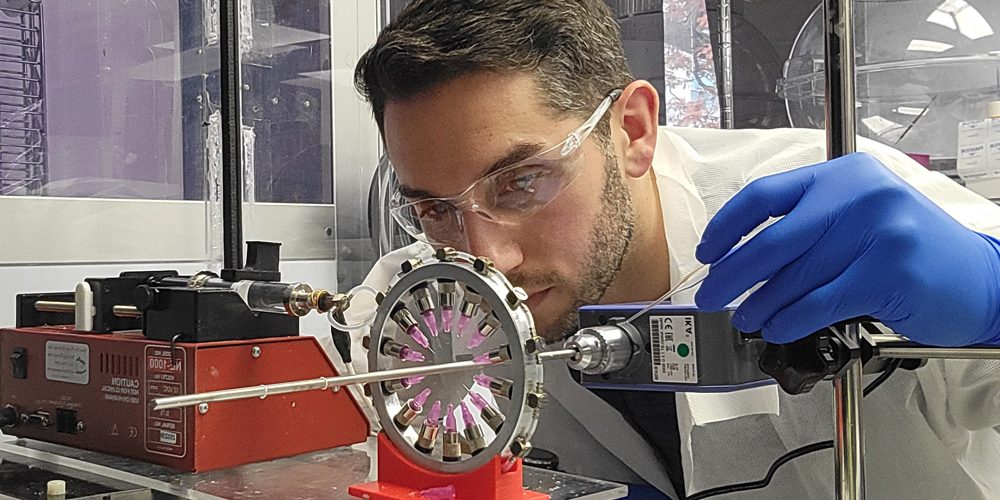Among the promising group of life science researchers and business students in the inaugural cohort of the BioEntrepreneurship Initiative is Anthony D’Amato, a postdoctoral fellow in biomedical engineering at Cornell. D’Amato is taking advantage of several of Cornell’s resources for entrepreneurs as he translates his research into a new venture that hopes to significantly improve the quality of care in vascular health.
D’Amato earned his Ph.D. in biomedical engineering from Rensselaer Polytechnic Institute in 2018, focusing his research on regenerating the injured spinal cord during his time as a doctoral student. As a postdoc at Cornell, he has shifted his attention to the development of biomaterials to treat vascular disease.
D’Amato’s most recent innovation comes in the form of grafts that aid in the regeneration of blood vessels. Instead of using a permanent structure like a stent or having to harvest veins from other parts of the body, the graft is introduced to encourage cells to regrow and rebuild the functional artery. Like dissolvable sutures, it eventually degrades, leaving no foreign material in the body. A portion of the research is being done in conjunction with the College of Veterinary Medicine.
“There is just a wealth of knowledge,” D’Amato said about vascular research. “It really seemed like the field was primed for some engineering innovation and I thought that I could contribute.”
As his research progressed, D’Amato began looking beyond the lab for outside application of the technology. Through programs including the BioEntrepreneurship Initiative, NSF I-Corps, and Ignite Postdoc for Ventures, D’Amato has taken advantage of multiple resources in Cornell’s entrepreneurial ecosystem to commercialize his research for clinical use.
D’Amato was accepted into the 2022-23 cohort of the BioEntrepreneurship Initiative, a program offered by the Samuel Curtis Johnson Graduate School of Management and administered by Cornell’s Center for Regional Economic Advancement (CREA), which pairs life science researchers with MBA students to develop scientific innovations into tangible business opportunities.
“Once I saw the call for applications for the BioEntrepreneurship Initiative, I realized that it could help bridge the gap, at least on the business side,” D’Amato explained. “The people that are involved with organizing and leading these discussions in the program have a lot of the experience that I hope to gain.”
Scholars like D’Amato are experts in their fields, having dedicated years to their research. However, branching out beyond the lab can prove difficult without adequate support. The BioEntrepreneurship Initiative was created in part to aid Ph.D. candidates and postdoctoral fellows, specifically studying life sciences, develop necessary business and leadership skills. Simultaneously, MBA students gain valuable experience working collaboratively with individuals innovating in one of the largest sectors of the economy.
Interdisciplinary collaboration is at the center of the BioEntrepreneurship Initiative approach. Both the MBA and the Ph.D. candidate or postdoc can use tools from their respective disciplines and learn from each other in the process. D’Amato spoke to his anticipation about gaining insight from MBA students, including Ike Nwafor and Lauren Kaminski, his partners in the program.
“Businesspeople think about things very differently, and as a scientist, I don’t have a lot of those skills to conceptualize and talk to people that they do,” he explained. “I’m really excited for the opportunity to be paired directly with a businessperson, and have the business school faculty to help me navigate these things that are going to be absolutely crucial for my research to reach its full potential.”
D’Amato is also a member of the inaugural Ignite Postdoc for Ventures cohort. The program, which works to pair postdocs with Cornell inventors to commercialize technologies, is housed in the Center for Technology Licensing (CTL). The structure of the program allows D’Amato and his fellow cohort members to work with Entrepreneurs-in-Residence (EIR) throughout the two phases of the program.
“In phase one, the postdoc will work under the supervision of the faculty member. In phase two, they will work under the supervision of the incubator director,” explained Lynda Inséqué, Assistant Director of Technology Initiatives and Outreach for CTL.
Through Ignite, D’Amato completed a National Science Foundation (NSF) I-Corps Regional Course. He explained how the program, hosted by Cornell University and the UNY I-Corps Node, has encouraged him to expand his horizons.
“It’s making me, the scientist who is a very scientifically-minded person, have to think outside the box,” D’Amato said, specifically citing the customer discovery interviews as challenging, but ultimately rewarding. “It enforces a flexibility in your target market.”
Over 4.5 weeks, the regional I-Corps course allows participants to gain entrepreneurial insight prior to commercialization efforts. For this reason, it is often recommended that members of the Ignite cohort either complete a course prior to their acceptance or early in phase one.
“I-Corps is a good supplement, even prerequisite, of the Ignite Postdoc program,” Inséqué said.
The understanding of commercialization achieved through I-Corps aids the postdoc as they move through the phases of Ignite and prepare to create a startup of their own.
D’Amato illustrated how each program has, in their own ways, aided in the expansion and application of his research. With the regional I-Corps course completed, D’Amato will use his newly gained knowledge in the BioEntrepreneurship Initiative and Ignite. These programs allow Cornell to create an environment where scholars like D’Amato, and innovation as a whole, can thrive.






